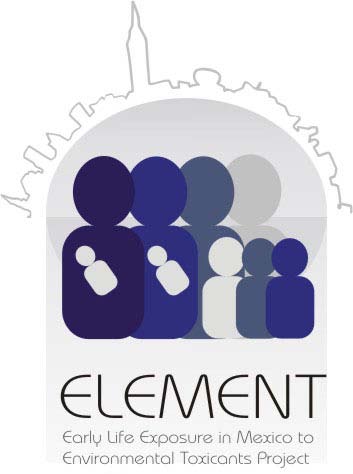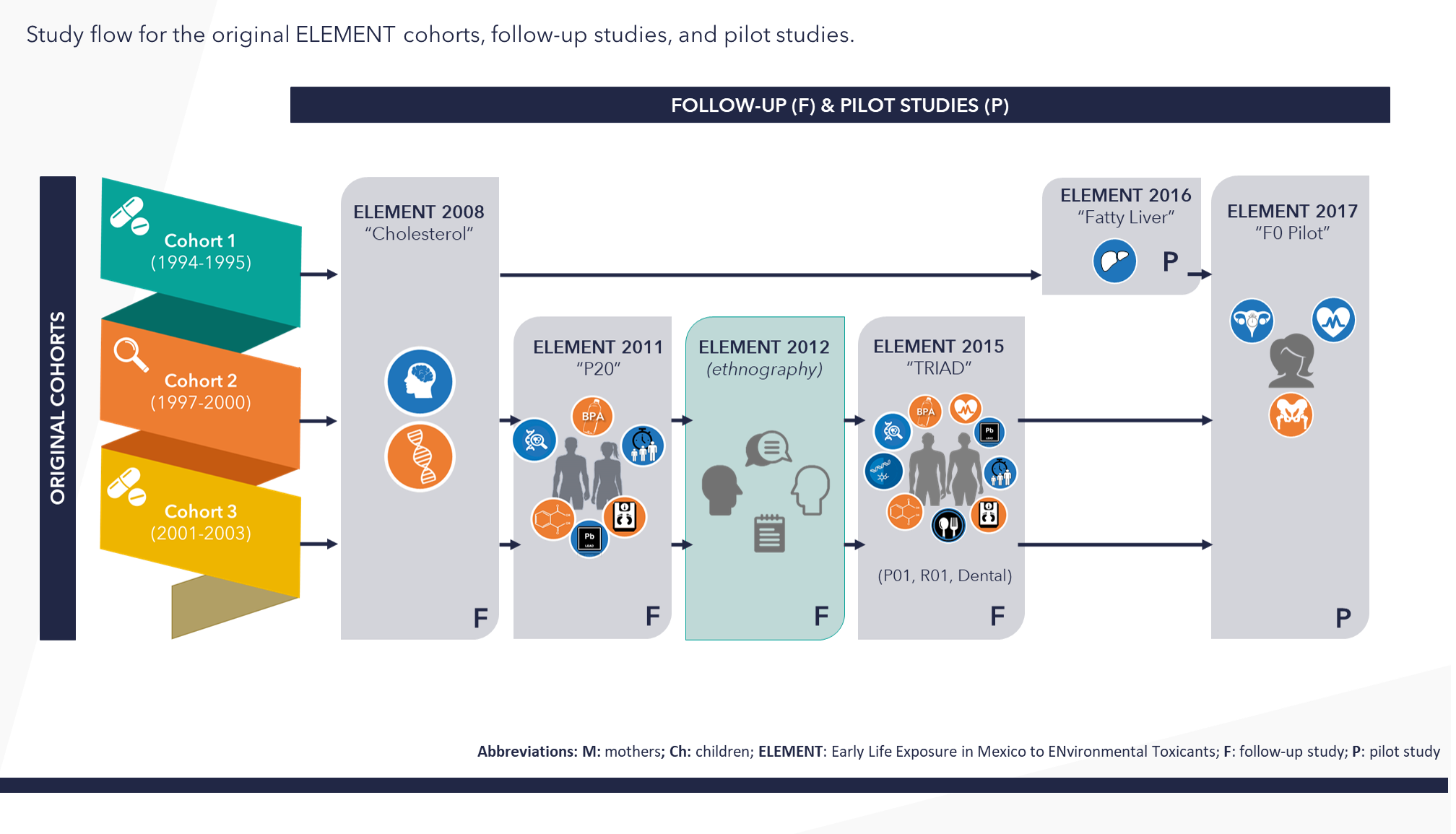Cohort Profile
 The ELEMENT study (Early Life Exposures in Mexico to ENvironmental Toxicants) is a multi-institutional and international research effort that has initiated
and followed three birth cohorts in Mexico City for more than 25 years. During this
period, a vast international research team has participated in the different phases
of the project, developed more than ten specific projects, initiated and followed
up on three different cohorts of mother / child pairs, competed and obtained various
grants from US and Mexican agencies, published the study's findings in journals of
high international impact, formed a large number of master's and doctoral students
on both sides of the border and, above all, contributed to relevant public policy
discussions.
The ELEMENT study (Early Life Exposures in Mexico to ENvironmental Toxicants) is a multi-institutional and international research effort that has initiated
and followed three birth cohorts in Mexico City for more than 25 years. During this
period, a vast international research team has participated in the different phases
of the project, developed more than ten specific projects, initiated and followed
up on three different cohorts of mother / child pairs, competed and obtained various
grants from US and Mexican agencies, published the study's findings in journals of
high international impact, formed a large number of master's and doctoral students
on both sides of the border and, above all, contributed to relevant public policy
discussions.
The first ELEMENT cohort began in 1994 with support from the Harvard Superfund Basic Research Program and individual R01 grants and was an inter-institutional collaboration among Harvard University, the Center for Population Health Research of the National Institute of Public Health in Mexico, the American British Cowdray Medical Center and the National Institute of Perinatology of Mexico.
ELEMENT was founded by Dr. Mauricio Hernández Ávila, researcher and current Director of Economic and Social Benefits of the Mexican Social Security Institute (Spanish: Instituto Mexicano del Seguro Social, IMSS), and Dr. Howard Hu, a physician (internist and occupational/environmental medicine specialist) and environmental epidemiologist who is currently an Adjunct Professor of Environmental Health Sciences at the University of Michigan School of Public Health and Affiliate Professor of Environmental and Occupational Health Sciences at the University of Washington School of Public Health.
The mother–child pairs of study participants were recruited over a series of years:
Cohort 1, 1994-1997
Cohort 2, 1997-2000
Cohort 3, 2001-2005
This first cohort sought to study the effects of lead on maternal and child health. However, since then the study has expanded its area of study in order to understand the effects on health and neurodevelopment derived from exposure to other environmental toxins, as well as to explore how these effects are modified by factors such as nutrition, aspects of the social environment and genetic susceptibility.
The National Institute of Public Health (INSP) is the main headquarters in Mexico of the ELEMENT study, where Dr. Mara Téllez Rojo of the Nutrition and Health Research Center (CINyS) is the current principal investigator and directs the field and research team of the INSP. In the United States, the lead researcher is Dr. Karen Peterson, professor and director of the Department of Nutrition Sciences at the University Of Michigan School Of Public Health.
Since its foundation, data has been collected from ELEMEN participant at different times including the prenatal period, early- to mid-childhood, adolescence, and young adulthood. All these follow-ups have helped us learn how environmental exposures to metals and chemicals during pregnancy and puberty can affect obesity, the rate of sexual maturation, and risk of metabolic syndrome (a combination of increased blood pressure, high blood sugar level, excess body fat around the waist and abnormal cholesterol levels). We are also looking at how what you eat and drink could change these effects.

In addition, we are working closely with anthropologists at the University of Michigan to better understand the context of our findings in the lives of our participants. Dr. Elizabeth Roberts and her team use a bioethnographic approach to study health and inequality in our ELEMENT cohort. Learn more about the MEXPOS and NESTSMX studies. In these projects her team and I trace the looping life conditions that shape bodily relations, challenging the notion of biology as fixed, universal, and apolitical.
The data collected from the ELEMENT cohorts have provided important information to better understand how people are affected by metals and chemicals. The results of these studies are shared with other scientists in Mexico and elsewhere to improve the safety of women and children. The ELEMENT study team is grateful to the study participants' contributions and dedication to the research which has made advances in science possible.
